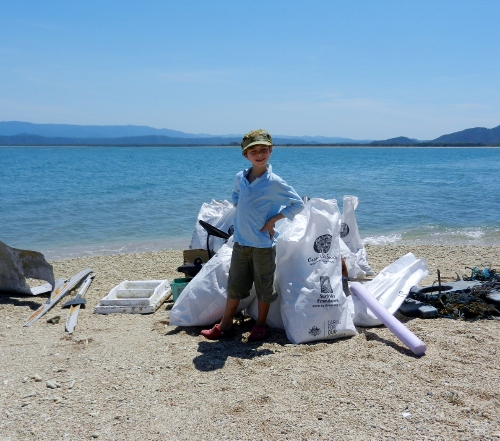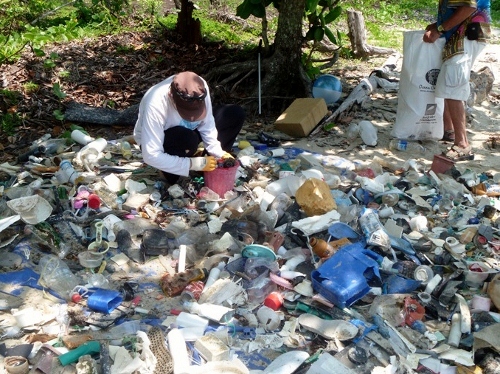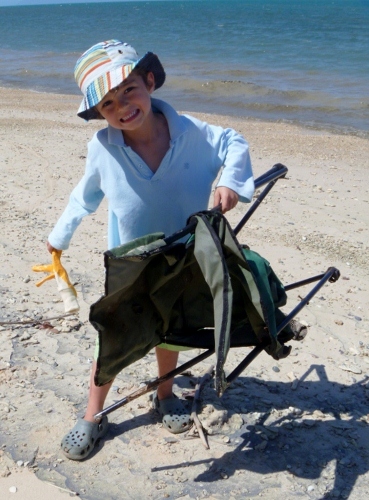
Beach clean up at Snapper Island. Thank you boaties for dumping all your rubbish!
I’d love to get a long-term volunteer position while we are traveling, but, it’s hard to get into and is expensive for the volunteer. For me, I don’t think it’s ever going to happen, somebody else, with less family commitments and more cash, will have the privilege of taking care of orphaned orangutans and elephants. But it is possible to find less glamorous ways of putting something back.
We are in Australia at the moment, here we try to do our bit through collecting junk from the beaches. Families can volunteer, the children are welcome and they can really get involved. They are the right size to go scurrying into bushes to collect plastic bottles. It’s like a treasure hunt for them, loads of fun and a lovely picnic lunch in a beautiful new place.
If you are traveling anywhere in Australia it’s something you could get involved in too, just check out the Tangaroa Blue website for the list of upcoming clean ups, send an email and turn up on the day wearing sun protective gear and a smile.

That’s me, sorting some of the smaller marine debris washed up on a secluded beach at Cape Tribulation.
Named after Tangaroa, the god of the ocean in Maori and Polynesian mythology, the Tangaroa Blue organization tries to look after the health of our oceans, minimizing marine debris and raising awareness of its negative impact on wildlife.
Groups of volunteers get together to blitz a given location on a given day. The organizers supply the equipment, gloves, bags and sharps boxes. They often provide transport too, last time volunteers went by boat to beautiful, deserted Snapper Island, a place that we would never have been able to see otherwise. The whole beach is made of coral and shells, dolphins were feeding just offshore. What a shame previous picnickers had left all of their rubbish there.
It’s an awesome team effort and one that results in hundreds of Kgs of marine debris being collected, sorted, categorized and properly disposed of, every time. On our first beach clean up, on Snapper Island, 35 volunteers collected 235 Kg of junk, including a car battery, a fridge, 115 thongs and endless small pieces of plastic and foam.
It’s not just about collecting, it’s about identifying sources and trying to intervene to decrease further contamination. We often pick up balloons, including weather balloons from the Cairns Bureau of Meteorology I think conversations are being had about this practice.

Boo finds the first bit of junk of the day on Snapper Island. Why would boaties dump their rubbish here?
We live on the doorstep of the Great Barrier Reef marine park. We’ve taken the children to the reef a few times to see exactly what it is we’re trying to protect, it’s an incredible and fragile ecosystem.
We homeschool/unschool and are always on the lookout for interesting ways to educate the kids, so these days are not truly altruistic, things rarely are.
Our beach clean ups have had an amazing impact on the children. They never walk past a piece of plastic or a cigarette butt on a beach, we always have to pick it up. They are aware that any plastic on the street could be washed into storm drains and head directly to the sea, we pick that up too.
They understand the threat to turtles and other marine animals from marine debris, and we’ve talked about how whole food chains and ecosystems could be affected, they care and truly want to help.
They see that if a thing needs doing, they could be the ones to do it.
They have met and talked to a good cross-section of people, from passing backpackers to senior citizens. People are always delighted to see the kids getting involved. ( What people like to think of as socialization, in educational terms.)
They see their parents and other adults giving their time freely, it’s a good behavior to model.
We also tick educational boxes, in homeschooling we report on what progress the children are making. Curriculum areas on the environment and how it changes through interaction with people are clearly covered, plus large chunks of science, geography and maths. We sort, count, measure and weigh everything, sounds like maths to me!
Catching them young like this, I hope, will make them aware of their obligations to the environment for the rest of their lives, before they become jaded and decide it’s up to somebody else to do something about it. I hope I’m making more responsible global citizens.

Tangaroa Blue is part of the Australian Marine Debris Initiative.
If you are interested in marine conservation you may like to head over to Green Global Travel and read an excellent interview with Jean-Michel Cousteau, son of one of my heroes, Jacques Cousteau. He’s 71 now, still working hard, trying to make sure our oceans have a future.
I look into the eyes of a 7- year-old and ask, “Am I going to let you down?” No, never!
Jean-Michel Cousteau
What do you think? Could you help out humanity as you travel or as part of your normal family life? Check out the Tangaroa Blue website to get involved.